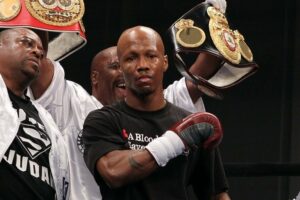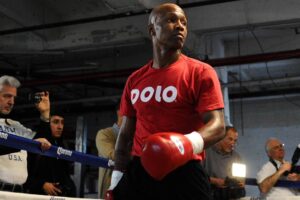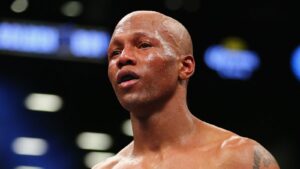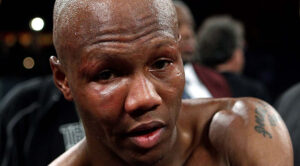Former world champion, Zab Judah, poses on a hospital bed, draping his arms proudly around his two kids. He is decked out, ironically, in the type of gown he used to dress his own patients in whilst admirably working as a nurse’s assistant after his boxing career had started to decline.

Admitted following complications this past Friday after a stoppage loss to existing world level contender, Cletus Seldin, it was the forty-one year old American’s third bout in the last six years. His was a career we’d long thought of as fulfilled, yet once again boxing’s strangle over its former employees had left its mark.
The adulation of a raucous audience, the support of family or friends and, at times, the monetary temptation of fighting at the highest level continues to drag men and women back through the ropes. But where does the blame lie?
The fighters remain loyal servants to a sport that’s seen them change their lives. It allows them the opportunity to provide financial security for their long-suffering parents or escape potentially poisonous upbringings. It offers an irreplaceable focus and a chance to stamp their names on a community worshipped by the ‘everyday man’. Just one more night. Lacing those gloves up one last time, sellotaping damaged bones and icing bruised egos.

Former IBF world champion, Steve Forbes, also recently made his return to professional boxing when hosting and headlining his own promotion in Oregon. Not quite a boxing haven, he’d been keen on boosting the sport in Portland and using his own profile to gain the attention of those lost, like-minded youngsters in need of purpose.
Forbes, forty-two, hadn’t fought in five years, but returned to defeat Tavoris Teague, a fairly harmless journeyman prepared (and paid) to play the victim. This was an elder statesman passing boxing on to the next generation as safely as could be expected.
Judah, though, stepped into the ring against a man dubbed ‘The Hebrew Hammer’, with the younger man possessing twenty knockouts from twenty-four wins and still extremely capable of ending a fight with brutal, unrelenting power.

Sure – Judah now seems to be making a steady recovery at time of writing, but doesn’t the matchmaking leave a lot to be desired? Sanctioning this bout was a dangerous act, whichever way you spin it. I’d read articles claiming Judah was searching for one last tilt at world titles. But that’s fiction, isn’t it?
The truth appears to be that whilst there are fighters left in the lurch, swimming in boxing’s shallow end, there will always be sharks preparing to feast on their reputations and those achievements of years gone by.
Judah was always going to garner interest. He was a multiple time champion, known worldwide. Surely there must be an element of care afforded by promoters, matchmakers or state athletic commissions? I accept that Seldin isn’t known for snatching the souls of his opponents, but he’s been beaten once and is nine years Judah’s junior with an active, 83% knockout ratio. That’s all I need to know.

Fighters, or former fighters specifically, need protecting from themselves. As news spread of Zab’s injury and admittance to hospital, fans of the sport were once again left scratching their heads. But these guys keep coming back for more.
British fighter Nick Blackwell suffered a severe injury during his bout with Chris Eubank Jr. He nearly died. Then, after making some semblance of a recovery, he began sparring in his local gym against licensed professionals again. He couldn’t escape boxing – he is a fighter, even now. Forever damaged.
Perhaps nothing could deter them from going to the well, one last time. Who are we to tell men or women who have dedicated their entire lives to the solitude of boxing, that it’s no longer something we are willing to permit? Loved ones, friends, fans. Should that be enough to slam the door shut on a glittering career?

Willie Limond, the accomplished, forty year old Scottish fighter returned only last week, two and a half years after his last contest. Danny Williams, the Brixton heavyweight, travelled to obscure parts of Europe for paydays, fighting until he was nearly fifty years old. Of course – George Foreman returned to boxing after a decade of inactivity, but in the nicest possible way, Foreman was a freak of nature. The story continues, with an abundance of fighters returning home to all they’ve known.
It’s easy to peak out through the curtains at what we think we know about the hurt business. But it’s no substitute for running in the cold, pitch black before sunrise or sweating out those last ounces before staggering onto the scales. That is boxing, as much as lifting sparkling belts and cashing cheques.
I hope Zab Judah returns to full health or as close to it as possible. I hope he never fights again, or even attempts to. Because it’s over. Sometimes beyond the bullshit that accompanies the loneliest of sporting endeavours, there lacks that element of true empathy or heart. We should all hope to see that change, regardless of the name in the brash, bold font, holding up the poster.
Feature written by: Craig Scott
Follow Craig on Twitter at: @craigscott209